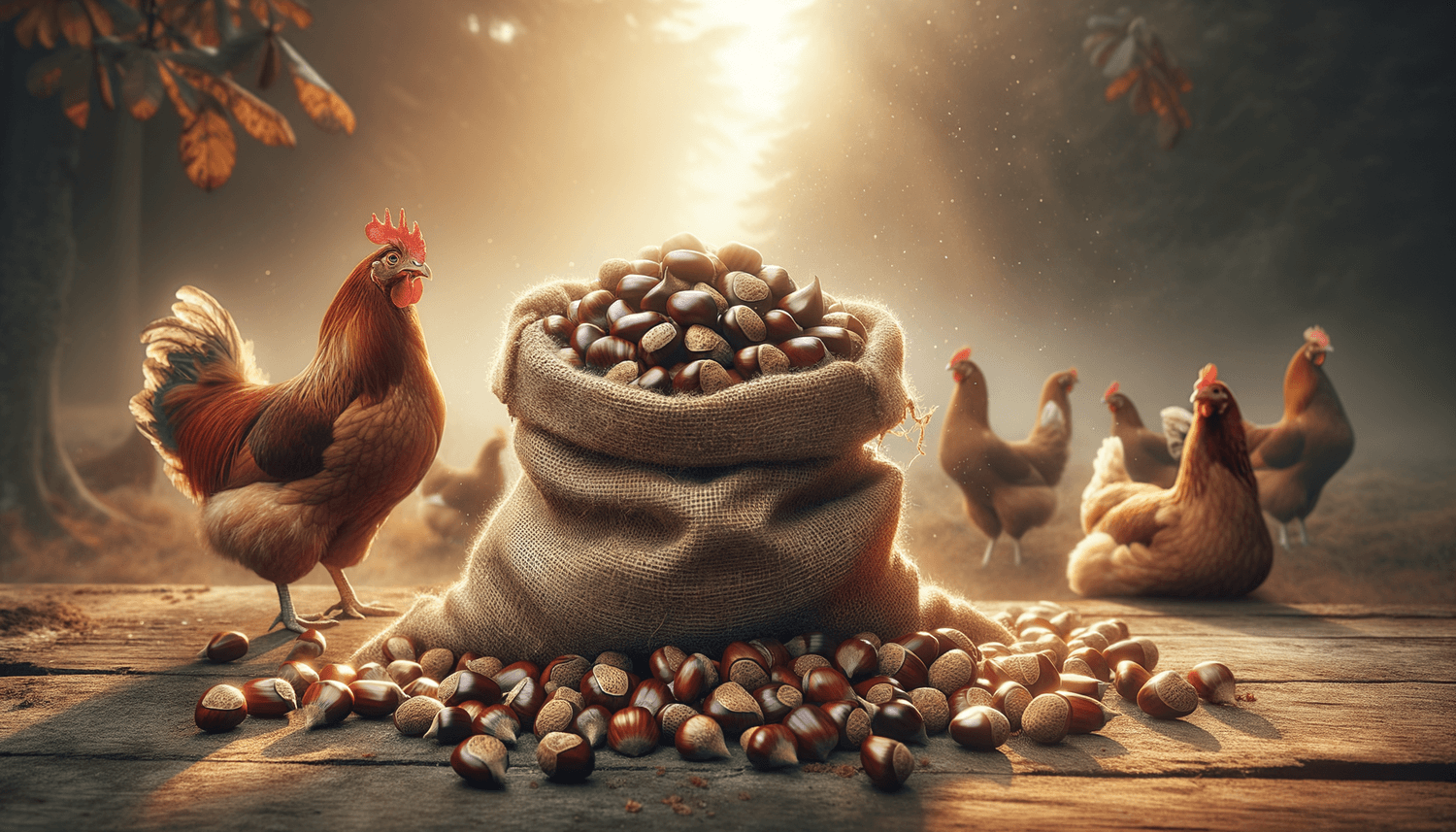Howdy backyard chicken enthusiasts! Are you wondering if your clucky companions can snack on some tasty chestnuts? Well, get ready to crack open knowledge on this nutty topic! In this fun and informative blog post, we’ll dish on whether chickens can or can’t gobble up chestnuts, the importance of a balanced diet, the nutritional value, and any potential benefits or risks of adding these delectable delights to their menu. Plus, we’ll throw in some tips on preparing the chestnuts for your beloved feathered friends! Get ready to go nuts for chestnuts, folks!
Can chickens eat chestnuts?
Yes, chickens can eat chestnuts and it is safe for them! Chestnuts are a nutritious treat packed with vitamins, minerals, and fiber, making them a healthy addition to your chicken’s diet. However, moderation is key, so be sure to balance their consumption with other essential nutrients to keep your feathery friends happy and healthy.
Keeping the balance: A chicken’s diet
Just like us humans, chickens thrive on a balanced diet. Providing your chickens with the right mix of nutrients helps ensure their overall health, egg production, and happiness. A chicken’s diet should consist primarily of high-quality chicken feed, which should make up around 80-90% of their daily intake. Chicken feed is carefully formulated to meet their nutritional needs, and it is the foundation of a healthy diet for your feathered friends.
Now, let’s talk treats! The remaining 10-20% of a chicken’s diet can, and should, consist of delicious goodies like fruits and vegetables. This not only adds variety and excitement to their meals but allows nutrient supplementation. But remember, moderation is key – overindulging in treats might lead to various health issues or imbalanced diets. So, keep on spoiling your clucky companions, and enjoy watching them happily peck and forage away in the backyard.
Nutritional value of chestnuts for chickens.
Feeding chestnuts to chickens can offer a range of nutritional benefits. One of the most notable aspects of these nuts is their high vitamin and mineral content. Chestnuts are rich in vitamins like vitamin C, B vitamins such as thiamine (B1), riboflavin (B2), niacin (B3), and folate (B9). These vitamins contribute to immune system support, energy production, and cellular growth, which can all help your chickens maintain good health and vitality.
When it comes to minerals, chestnuts are packed with essential nutrients like potassium, magnesium, phosphorus, and iron. Potassium helps with maintaining proper heart function, while magnesium and phosphorus support strong bones – essential for any active and healthy chicken. Additionally, iron plays a vital role in red blood cell production and oxygen transportation.
Not only that, but chestnuts are also rich in dietary fiber, which can support healthy digestion in your chickens. The fiber in chestnuts works to regulate intestinal function, which can aid in overall gut health. Moreover, chestnuts contain a relatively high water content compared to other nuts, which can help promote hydration in your flock.
In summary, chestnuts have ample nutritional value for chickens and can offer them various health benefits, making them a healthy, nutrient-rich treat when given in moderation.
Nutrition table of chestnuts for chickens.
| Information | Description |
|---|---|
| Nutritional Value | Rich in vitamins (like C, B1, B2, B3, and B9), minerals (potassium, magnesium, phosphorus, and iron), and dietary fiber. |
| Suggested Serving Size | Small amounts, as occasional treats, in moderation with other fruits and vegetables. |
| Safe Feeding Practices | Feed only cooked or roasted chestnuts, and take care not to overfeed. |
| Preparation | Can be cooked or roasted before feeding, remove the outer shell, and cut or crush into smaller pieces. |
| Potential Risks | Overfeeding or feeding uncooked chestnuts may lead to health issues or imbalanced diets. |
| Hydration | Higher water content compared to other nuts, promoting hydration. |
| Digestion | Dietary fiber supports healthy digestion and intestinal function. |
| Seasonal Availability | Fresh chestnuts are available primarily during the fall and winter months. |
| Other Benefits | Adds variety, excitement to meals, and supports overall health and vitality. |
Preparing chestnuts for your chickens
Before offering chestnuts to your backyard flock, it’s important to properly prepare them. Uncooked chestnuts can be tough for chickens to digest, so cooking or roasting them is highly recommended. To do this, first, remove the outer shell, as it’s not suitable for consumption. Next, cook the chestnuts either by boiling or roasting until they’re soft and tender.
When the chestnuts have cooled down, cut or crush them into smaller pieces that are easy for your chickens to peck at and enjoy. It’s essential to monitor your flock during feeding time to ensure they are not struggling to eat the pieces and to avoid any risks of choking.
Possible alternatives to chestnuts
If you would like to mix up the treats you offer your chickens or don’t have access to chestnuts, there are plenty of other options. Some chicken-friendly treats include fruits, such as apples, berries, and melons, or vegetables like lettuce, spinach, and pumpkins. Just like with chestnuts, it’s important to manage how much you’re feeding your fluffballs and keep the treats limited to 10-20% of their diet.
Another fun way to treat your chickens is by offering them grains, such as cracked corn, barley, or wheat. Grains provide additional nutrients and can be a great source of entertainment for your chickens, as they love to scratch and forage in search of tasty morsels.
Final thoughts
In conclusion, chestnuts can be a nourishing, fun, and tasty addition to your chicken’s diet, offering various benefits like vitamin and mineral content, hydration, and improved digestion. Remember to serve cooked and prepared chestnuts in appropriate serving sizes, alongside a balanced and nutritious diet. Your backyard chickens will surely appreciate these delightful treats as they peck and forage their way through a happy, healthy life!

















